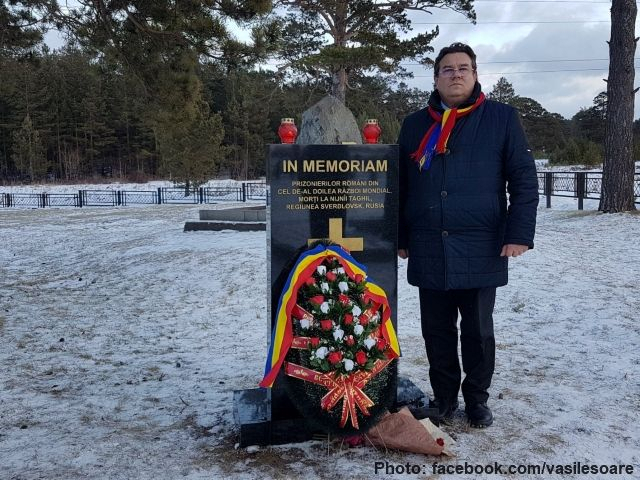Romanian POWs who died in detention in the USSR
Romanias embassy in the Russian Federation publishes names of Romanian POWs who died in USSR in WWII.

Steliu Lambru, 20.07.2020, 14:00
For the countries in the eastern half of Europe, Romania included, the end of WWII brought with it Soviet occupation. Hundreds of thousands of Romanian soldiers died during the war in the Soviet Union, while tens of thousands of prisoners died in camps or are unaccounted for. To remember the Romanians who died in WWII on the eastern front, Romanias embassy in the Russian Federation published a list of Romanian army prisoners who died in detention in the USSR. The list also includes civilians identified in the Russian archives.
Vasile Soare, Romanias ambassador to Moscow, led efforts to discover the names of the dead:
“Just before Easter, we at the Romanian embassy in Moscow achieved something that is a first in Romanian historiography, namely the publication of a complete list, containing all the information on the subject available in the Russian archives, of the Romanian prisoners of war and civilian prisoners who died in prisoner camps on the territory of present-day Russian Federation. They were buried in the vicinity of these camps between 1941 and 1956. The list contains the names of 20,718 Romanians, most of whom were prisoners of war and therefore soldiers.”
The effort to track down all these names was intense and lasted more than a decade. Vasile Soare explains to Radio Romanias Moscow correspondent Alexandr Beleavski how the number and status of the prisoners on the list was established:
“Wed been working to finalise the list for ten years. Last year we published half of the list, containing over 10,000 names, and now we managed to finalise the list by adding another 11,000 names to it. Were speaking exclusively about prisoners, and not people who died in battle in Stalingrad or at the bend in the river Don, were speaking about survivors of the great battles who were captured and became prisoners of war. The list also includes civilians, more precisely ethnic Germans who were deported in January and February 1945. They were displaced from Romania shortly before the end of WWII, when a considerable number of ethnic Germans were forcefully displaced from Central and Eastern Europe. The largest number came from Romania, around 70,000 people, some 8,000 of whom died in Soviet labour battalions and camps.”
In the fog of war there were many unknowns and it was for the following generations to clarify them as much as possible. Vasile Soare tells us the story of the Romanian prisoners of war in the USSR in the 1940s:
“The first began to arrive in the Soviet camps in 1941. The majority arrived in 1942, more than 100,000 people, a very large number, and even after 23rd August 1944 and later, after October 1944. It is difficult to establish an exact number but from what we found in the archives were estimating 236,000 Romanian prisoners. It appears that about 65,000 died in the camps. We only know exactly what happened to the almost 21,000 names we found in the archives and published. After the battles of Stalingrad in the Don river bend that took place from November 1942 until towards March-April 1943, no records were kept of the foreign prisoners of war who entered the Soviet camps. So there are tens of thousands of people who were never officially recorded, which accounts for this difference in numbers. Compared with the Russian official statistics, which indicate 15,435 deaths among Romanian prisoners of war, when we studied the archives we found the number to be higher. On closer inspection, we realised the additional numbers were different people, so we added them to the list and arrived at 20,718.”
The names of 40,000 Romanian prisoners of war are yet unknown. Vasile Soare describes the most difficult things about working with old archives:
“The most difficult part was understanding the handwriting. Every entry was written by hand by the Soviet soldiers working in the camps who often spelled the names of the foreign prisoners as they heard them. There were many mistakes and it was hard to establish the actual names of the prisoners. We wanted to publish the list around Christmas 2019, but it wasnt possible; we were, however, able to get it published in time for the 75th anniversary of the end of WWII.”
The list contains the soldiers names and surnames, the names of their fathers, their dates of birth, the camp where they were interned and the dates of their death It also contains an appendix listing all camps, special NKVD hospitals and labour battalions where the civilians who were deported were interned. Since publication, many Romanians have identified the names of their relatives, grandfathers and great-grandfathers, in what has been a very emotional experience. Apart from the study of archives and field research into the names of the Romanians who died in Russia, the Romanian embassy is also leading a campaign to memorialise the places where they died almost 80 years ago. So far, 34 memorials have been built on the territory of present-day Russian Federation to commemorate the Romanians who died. Some of these memorials are accessible to visitors. Many of the places where Romanians died have been forgotten in time, but others have been remembered again and are about to be memorialised.






























